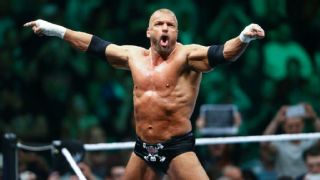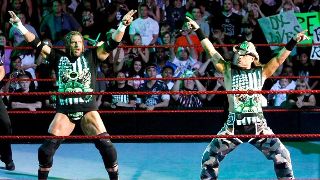|
As compelling as the physical aspect of professional wrestling can be, the element that makes this American institution stand out is the psychology that goes into working the crowd. Few in the history of the business have been better at this than Paul "Triple H" Levesque. This mastery led "The Cerebral Assassin" to 14 WWE world championship reigns -- two shy of the all-time record held by Ric Flair -- and he's now helping the next generation of wrestlers in his role as the WWE's executive vice president of talent, live events and creative. Levesque shared a bit of his unparalleled psychological expertise in a recent interview. Character developmentThe conversation got underway with discussion of the classic rule that says the best wrestlers take a facet of their personality, turn it to the front, then turn the volume up to 10. Levesque said it doesn't necessarily work that way in every case. "Everybody is different, every single person," he said. "There are a lot of talents that, over the years, you take them and you turn their personality way up and that's them. That's their character. And that works for a lot of guys. "A lot of them, as they become good, they start to morph themselves in a bigger, better way. And those are the ones that you just try to help cultivate to become big stars by turning up the volume." Levesque went on to note that, in many cases, character development requires going in a completely different direction from who the person is outside the ring. "There are a lot of other guys [who] need to transform into something else," Levesque said. "In their personal lives they're quiet, or they're reserved or whatever, and when the red light goes on and you give them a character that they can sink their teeth into, they become something great. If you knew Glenn Jacobs and you knew Kane, they're two totally different things. That's kind of the arc of what we do." BelievabilityLevesque said believability is a key element to getting any character over. "They really have to feel it and believe it," he said. "It's no different than acting in a movie. I'm sure if you don't really feel that role and it's not just you, then you look like you're acting. And that to me that is always the kiss of death. "I have to say to guys all of the time, when they send me stuff on a character or a persona they're trying on, I say, 'I don't believe it.' I don't believe that's what he thinks he is or I don't believe that's what he feels." Sometimes the toughest part of making a believable character come to life is helping the talent understand what the audience is willing to believe. "We had a character, a kid in developmental, at one point in time, that came to me dressed in jeans and a ripped T-shirt," Levesque said. "And he came to me to show me this character. This guy was the furthest possible thing you would ever think of being a badass. And I said, 'Why are you wearing that?' "He said, 'It's a new character I want to try. It's me as an asskicker.' And it just made me laugh. I was like, 'I don't care what you do, nobody is going to see you as that.' It's just people understanding what they can be taken as legitimately and how they can perform it in a way that's believable."  Enhancement matchesEnhancement matches -- showdowns in which contracted WWE superstars face local talent in an effort to make them look strong -- recently returned to the WWE Universe on both Raw and SmackDown Live after an extended absence. When asked if these matches would continue to be a staple, Levesque said he views them as only one part of a larger picture. "Anytime you do a match, you're trying to get personalities over," he said. "Because for the most part, people appreciate great wrestling, but if they don't care about the performers and they don't care about the story between the two performers, they don't care about the match. They just don't. They'll get to the end of it and they'll go, 'Wow, that was really exciting and they did some crazy stuff when the one guy did the thing, you know, like I don't remember his name, but he did the crazy move.' "The moves and the matches only are great when they're with great stories; when those stories are rich, and the characters are rich and you can get involved in them. And when the matches deliver that and you're invested in those characters -- that's when it's magic." When asked to clarify the purpose of enhancement matches -- whether they were designed to get a gimmick over, to get a wrestler over or both -- Levesque had an interesting take. "Enhancement matches on the shows, to me, are designed to get personalities over," he said. "It's designed for one guy to go out there -- yeah, he beats up another guy, but what was he doing while he was doing that? He was establishing his moves, so I see what this guy does and see the kind of a style in which he wrestles? "But if he just goes out there and just does a few moves with no personality and no charisma, I still don't care about him. I just know he's better than the other guy, who didn't look like he was very good in the first place." We then dug into more specific instances of these kinds of enhancement matches, starting with Braun Strowman, who was recently separated from the Wyatt Family in the brand extension draft. "We're resetting Braun Strowman," Levesque said. "We're resetting who he is, and resetting his character and his personality so that you can learn more about him and feel for him. It's the same thing with Nia Jax and any of these characters that we do those things with." "When I write NXT, I never go, 'I just need to get so and so a match,' and give them an enhancement match," he said, relating his different experiences at that level. "It's not what I want to do. I give it to them so I can see a different part of his personality. If I give [Shinsuke] Nakamura an enhancement match in NXT at this point, it's so I can get the entertainment side of him out that I can't get if he's out there and he's going to wrestle Samoa Joe. "I want to see a different side of him, so I give him something that he can do that different side in and show me that personality." 50/50 bookingThe internet is filled with talk about how so-called "50/50" booking -- when two talents (or sometimes more) trade wins and end up on even footing over the course of a series of matches -- can never work to get a wrestler over. As might be expected, Levesque had a completely different point of view. "It's just a term somebody came up with," Levesque said. "It's just terms that people throw out there. "When somebody goes, 'Well, you just can't get people over with 50/50 booking,' [I'll always say] 'Oh, I'm sorry, how's your territory coming? Because this one seems to be doing pretty good over here.' We just had the largest WrestleMania in history. People talk a lot of smack about ratings and things, but they don't understand all of the dynamics of everything we do. They don't. They sit on the internet and they read one thing and they give their point of view." Levesque went one step further and noted that he doesn't even keep track of won-loss records. "Do I keep track of the exact wins and losses of talent? No," Levesque said. "To me, all of this stuff is a feel. All of it is a feel. "Sometimes you're beating a talent because you want to beat them and that's the sympathetic reaction you're trying to elicit. There are some talents that, when you beat them, they get more popular, but as soon as they start on a winning path, their popularity begins to wane. ... People want that underdog to strive to succeed and then get a little bit of success and then get knocked back off that perch and be the underdog again." He also indicated that mindset of not placing an emphasis on wins and losses comes all the way from the top of the company. "People don't understand it when Vince [McMahon] will say it's not about wins and losses or those things. Do they matter? Sure. Are they the be all, end all? Absolutely not. "I suppose there's a stone somewhere that it's written on that says, 'Thou shalt not book 50/50 because it won't lead to success for your promotion.' We'll stand on that stone while we're selling out Brooklyn three days in a row."  Tag teamsWhen Levesque was asked if the company is moving back in the direction of having more tag teams, he noted that the move away from tag teams was never really about a change in the company's card-building philosophy. "I think you go back five or six years ago when the tag teams were on the decline. Part of that was a thinner talent roster," he said. "NXT has been able to beef up the ranks enough for us to split rosters, and you see this resurgence. ... I'm really proud of them -- of the entire developmental system. It has allowed for the resurgence of tag-team wrestling and resurgence of women's wrestling by giving them the platform to be able to do what they do." Levesque said part of reason the company is placing a larger emphasis on tag teams is so it can help some talent develop in a way it couldn't in a singles environment. "Sometimes when you're a talent, there's safety in numbers. You gotta go out on a limb when you're a performer. And it's uncomfortable," Levesque said. "And people that don't do it for a living don't understand it, but being a performer and going out there and just letting it all hang out there, when it's just on you, and you're the only one -- man, it's hard to do that. "When you've got somebody else to blame, somebody else sharing in the success and somebody standing next to you, supporting you on the team, it's liberating. The challenge is then getting past the liberation when it's time to move out on your own. Can you then make that transition? Does that lead to them being singles wrestlers? Who knows."
|

